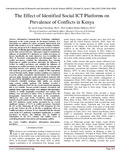The Effect of Identified Social ICT Platforms on Prevalence of Conflicts in Kenya
Abstract
Information Communication Technology contributes immensely to the world economy. In Developed countries, ICT innovations are utilized for safety, economic improvement and health while much is yet to be realized in developing countries. Africa has advanced in ICT though not clear on how it enhances the people’s wellbeing apart from positive and negative causes on moral value erosion and wars. This paper sought to establish the influence of identified ICT platforms on conflict prevalence in Kenya. Specifically, the study objectives were to establish the effect of Facebook communication and information flow on conflict prevalence, establish the information flow through WhatsApp on conflict prevalence, determine the influence of Twitter on conflict prevalence and establish the influence of Instagram on conflict prevalence in Kenya. Social exchange and innovation theories were adopted. The population of the study will entail the general public with a sample of 384 respondents sourced through media. Simple random sampling was employed to get the sample respondents. Questionnaires were formulated and sent online through the media and feedback analyzed with the aid of SPSS. Reliability of the instruments was ensured using Cronbach’s reliability technique while validity was checked using content validity methods. The findings revealed a reliability coefficient of 0.83 for the overall instruments implying that it was reliable. Pearson product moment correlation and multiple linear regression models were mingled with descriptive statistics to obtain meaningful associations and ratings. The findings were presented in tables. First, it emerged from the demographic characteristics that most of the respondents, 200(52.6%) were aged 51-60, 171(45.0%) were male and majority of professionals worked in NGOs. The findings revealed that ICT platforms (social media) accounted for an overall significant variance of 72.1% in conflict prevalence. Facebook (β=.333, p<.05), WhatsApp (β=.329, p<.05), Instagram (β=.278, p<.05) and Twitter (β=.225, p<.05) has a significant effect on Conflict prevalence in Kenya. It was concluded that the selected social media ICT platforms contributed significantly to conflict prevalence in Kenya. The findings may be helpful to stakeholders in the ICT, scholars and conflict sector in controlling disruptive innovations and managing conflicts.
URI
https://www.rsisinternational.org/journals/ijriss/Digital-Library/volume-6-issue-5/344-350.pdfhttp://hdl.handle.net/123456789/6102
Collections
- Journal Articles (BE) [333]

